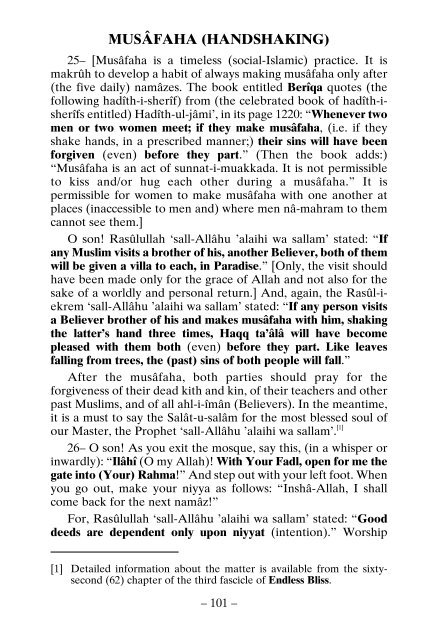O Son !
THE BOOK ‘O SON’ Al-hamdu lillâhi Rabbil ’âlamîn. Wa-s-salâtu wa-s-salâmu ’alâ Rasûlinâ Muhammadin wa Âlihi wa Sahbihi ajma’în. 1– O son! Collecting from books written by the scholars of the Hanafî Madhhab three hundred and sixty hadîth-i-sherîfs and forty-four khabars and also the seven essentials and the five rukns and the seven wâjibs and the fourteen sunnats and the twenty-five mustahabs and the fourteen mufsids of namâz, I have explained them for you. Adapt your acts and deeds to these teachings so that you attain fayz and nejât (salvation)! 2– Also for your information, I have collected a thousand and ninety âdâb (adabs) for you and for other young Muslims like you. If you adapt your actions and acts of worship to these teachings, they will be sufficient for you. If you laze, disobey Allâhu ta’âlâ and cease from these practices and manners, you will be afflicted with slavery and disgrace in the world and subjected to torment in the world to come. If you live up to them and advise your Muslim brothers to do the same, it will be useful for you. They will say blessings over you. And Haqq ta’âlâ will accept their invocations. For, a slave will be pardoned on account of another slave’s invocations for them.
THE BOOK ‘O SON’
Al-hamdu lillâhi Rabbil ’âlamîn. Wa-s-salâtu wa-s-salâmu ’alâ
Rasûlinâ Muhammadin wa Âlihi wa Sahbihi ajma’în.
1– O son! Collecting from books written by the scholars of the
Hanafî Madhhab three hundred and sixty hadîth-i-sherîfs and
forty-four khabars and also the seven essentials and the five rukns
and the seven wâjibs and the fourteen sunnats and the twenty-five
mustahabs and the fourteen mufsids of namâz, I have explained
them for you. Adapt your acts and deeds to these teachings so that
you attain fayz and nejât (salvation)!
2– Also for your information, I have collected a thousand and
ninety âdâb (adabs) for you and for other young Muslims like you.
If you adapt your actions and acts of worship to these teachings,
they will be sufficient for you. If you laze, disobey Allâhu ta’âlâ
and cease from these practices and manners, you will be afflicted
with slavery and disgrace in the world and subjected to torment in
the world to come.
If you live up to them and advise your Muslim brothers to do
the same, it will be useful for you. They will say blessings over you.
And Haqq ta’âlâ will accept their invocations. For, a slave will be
pardoned on account of another slave’s invocations for them.
You also want an ePaper? Increase the reach of your titles
YUMPU automatically turns print PDFs into web optimized ePapers that Google loves.
MUSÂFAHA (HANDSHAKING)<br />
25– [Musâfaha is a timeless (social-Islamic) practice. It is<br />
makrûh to develop a habit of always making musâfaha only after<br />
(the five daily) namâzes. The book entitled Berîqa quotes (the<br />
following hadîth-i-sherîf) from (the celebrated book of hadîth-isherîfs<br />
entitled) Hadîth-ul-jâmi’, in its page 1220: “Whenever two<br />
men or two women meet; if they make musâfaha, (i.e. if they<br />
shake hands, in a prescribed manner;) their sins will have been<br />
forgiven (even) before they part.” (Then the book adds:)<br />
“Musâfaha is an act of sunnat-i-muakkada. It is not permissible<br />
to kiss and/or hug each other during a musâfaha.” It is<br />
permissible for women to make musâfaha with one another at<br />
places (inaccessible to men and) where men nâ-mahram to them<br />
cannot see them.]<br />
O son! Rasûlullah ‘sall-Allâhu ’alaihi wa sallam’ stated: “If<br />
any Muslim visits a brother of his, another Believer, both of them<br />
will be given a villa to each, in Paradise.” [Only, the visit should<br />
have been made only for the grace of Allah and not also for the<br />
sake of a worldly and personal return.] And, again, the Rasûl-iekrem<br />
‘sall-Allâhu ’alaihi wa sallam’ stated: “If any person visits<br />
a Believer brother of his and makes musâfaha with him, shaking<br />
the latter’s hand three times, Haqq ta’âlâ will have become<br />
pleased with them both (even) before they part. Like leaves<br />
falling from trees, the (past) sins of both people will fall.”<br />
After the musâfaha, both parties should pray for the<br />
forgiveness of their dead kith and kin, of their teachers and other<br />
past Muslims, and of all ahl-i-îmân (Believers). In the meantime,<br />
it is a must to say the Salât-u-salâm for the most blessed soul of<br />
our Master, the Prophet ‘sall-Allâhu ’alaihi wa sallam’. [1]<br />
26– O son! As you exit the mosque, say this, (in a whisper or<br />
inwardly): “Ilâhî (O my Allah)! With Your Fadl, open for me the<br />
gate into (Your) Rahma!” And step out with your left foot. When<br />
you go out, make your niyya as follows: “Inshâ-Allah, I shall<br />
come back for the next namâz!”<br />
For, Rasûlullah ‘sall-Allâhu ’alaihi wa sallam’ stated: “Good<br />
deeds are dependent only upon niyyat (intention).” Worship<br />
[1] Detailed information about the matter is available from the sixtysecond<br />
(62) chapter of the third fascicle of Endless Bliss.<br />
– 101 –

















